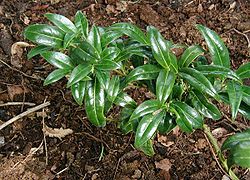Sarcococca
| Habit | shrub
| |
|---|---|---|
| Lifespan: | ⌛ | perennial |
| Features: | ✓ | evergreen |
|---|
|
Buxaceae > |
Lindl. > |
Sarcococca, Sweet box, or Christmas box is a genus of 16-20 species of flowering plants in the family Buxaceae, native to eastern and southeastern Asia and the Himalaya. They are slow-growing evergreen shrubs 1-2 m tall. The leaves are borne alternately, 3-12 cm long and 1-4 cm broad. They bear fragrant flowers, often in winter. The fruit is a red or black drupe containing 1-3 seeds. Some species are cultivated for ground cover in shady areas.
Read about Sarcococca in the Standard Cyclopedia of Horticulture
|
|---|
|
Sarcococca (Greek, flesh and berry, alluding to the fleshy fruit). Buxaceae. Ornamental woody plants grown chiefly for the handsome lustrous foliage. Evergreen glabrous shrubs: lvs. petioled, alternate, coriaceous, entire, without stipules: fls. unisexual, apetalous, in short axillary racemes with the pistillate fls. at the base; sepals 4 or 6; disk wanting; staminate fls. with 4-6 stamens opposite the sepals; pistillate fls. with a 2-3-celled ovary with 2-3 short erect or recurved styles: fr. indehiscent, globose to ellipsoid, coriaceous or fleshy, 1-2-seeded.—Five species distributed from Cent. and W. China to the Malay Archipelago. They are handsome evergreen shrubs with ovate to lanceolate entire lustrous leaves, rather insignificant whitish flowers in axillary clusters and red or purple berry-like fruits. S. ruscifolia and S. Hookeriana var. humilis have proved hardy in sheltered positions at the Arnold Arboretum, while S. saligna is tender. They do not seem particular as to the soil and do best in partly shaded situations. Propagation is by seeds or by cuttings which root easily. CH
|
Cultivation
Propagation
Pests and diseases
Species
- Selected species
- Sarcococca confusa Sealy - Sweet Box
- Sarcococca hookeriana Baill. (including S. hookeriana var. humilis, syn. S. humilis)
- Sarcococca longifolia M. Cheng
- Sarcococca longipetiolata M. Cheng
- Sarcococca orientalis C. Y. Wu
- Sarcococca ruscifolia Stapf
- Sarcococca saligna (D. Don) Mull.-Arg.
- Sarcococca vagans Stapf
- Sarcococca wallichii Stapf
Gallery
References
- Standard Cyclopedia of Horticulture, by L. H. Bailey, MacMillan Co., 1963
External links
- w:Sarcococca. Some of the material on this page may be from Wikipedia, under the Creative Commons license.
- Sarcococca QR Code (Size 50, 100, 200, 500)
